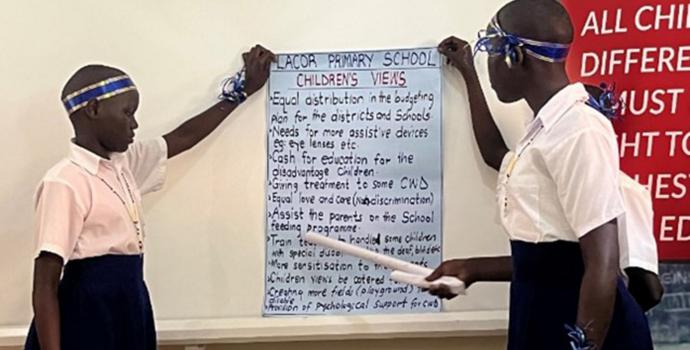More than 60,000 refugee and host community children in Uganda supported to learn from home during COVID-19

An investment by Education Cannot Wait is providing learning and mental health support for more than 60,000 refugee and local host community children in Uganda who are out of school due to the Covid-19 outbreak.
Schools across the country are closed as a precautionary measure – alongside wider restrictions on movement and community gatherings – and more than 15 million children, including 600,000 refugee children, are now out of school. The Ministry of Education & Sports in Uganda moved quickly to develop a Preparedness and Response Plan that aims to continue learning while schools are closed.
Education Cannot Wait (ECW) – the global fund dedicated to education in emergencies – immediately allocated US$1 million to support implementing the Plan, including US$525,000 to the Education Consortium, which is hosted by Save the Children.
The Education Consortium is using the funds to build on its existing ECW investments in refugee-hosting districts. Five partners – Finn Church Aid, Humanity & Inclusion, Save the Children, War Child Holland and ZOA – will roll out the new activities with a focus on ensuring that children can continue learning from home during Covid-19 through:
- Disseminating 38,000 home learning kits with resources to enable children to study by themselves at home
- Running classes on the radio including interactive call-in sessions. More than 900 solar-powered radios are being distributed to some of the poorest households to ensure that they are not excluded.
- Adapting innovative tech-based solutions such as Can’t Wait to Learn, which uses interactive literacy and numeracy games on solar-powered tablets and has been successfully piloted at local schools.
- Providing guidance and tips to parents and caregivers on how they can support learning from home.
- Supporting the most vulnerable children with disabilities with personal home visits from inclusive education specialists. They will also access critical rehabilitation and physiotherapy.
In addition, vulnerable children will be provided with mental health and psychosocial support (MHPSS). A helpline has already been set up to provide life-saving counselling and support in three districts and will be expanding to four more districts over the next two weeks. The helpline is staffed by social workers who speak the local languages and can refer cases to qualified counsellors and other services as required. MHPSS kits including games, activities and essential information will also be distributed to the most vulnerable households.

The project is providing child-friendly information on Covid-19, including on hand-washing and protection. Schools will be equipped with additional hand-washing stations and soap for when they reopen, and a “back to school” campaign will also run to encourage children to return when it is safe to do so. There is a high risk of children dropping out and not returning as the worsening economic situation means that many children from poor families may be forced into work or child marriage to support their families.
Yasmine Sherif, Director of Education Cannot Wait, said:
“Thanks to the Government of Uganda, the civil society consortium and UN agencies, ECW was able to support and contribute a major investment in the Education Response Plan for refugees and host communities. We saw progress for refugee and host-community children finally being able to access quality education, especially girls and children with disabilities – and then, COVID-19 hit. An unprecedented challenge appeared just as access to education was on the rise.”
“Thanks to speedy and coordinated efforts by both the Government and education partners on the ground, a strategy for responding to COVID-19 was developed. It needs our support. We must not allow COVID-19 to reverse this progress and it is crucial that together, we redouble our efforts to ensure that learning can continue even when schools are closed so these vulnerable girls and boys sustain their learning and their hope.”
The funding is part of an initial $23 million global package from Education Cannot Wait to 26 countries or emergency contexts.
25 civil society organisations – also including Save the Children, World Vision, Plan International, Norwegian Refugee Council and more – have signed a joint statement calling for donors to provide at least another $50 million to ECW as part of the response to the current Covid-19 crisis.
Notes to editors
These activities will run in nine refugee-hosting districts: Adjumani, Arua, Isingiro, Kamwenge, Kikuube, Kyegegwa, Madi-Okollo, Obongi and Yumbe.




